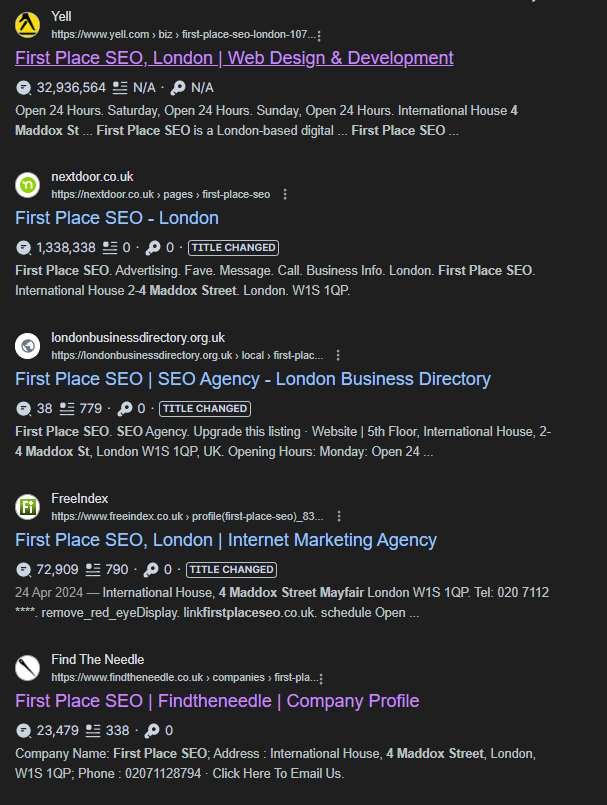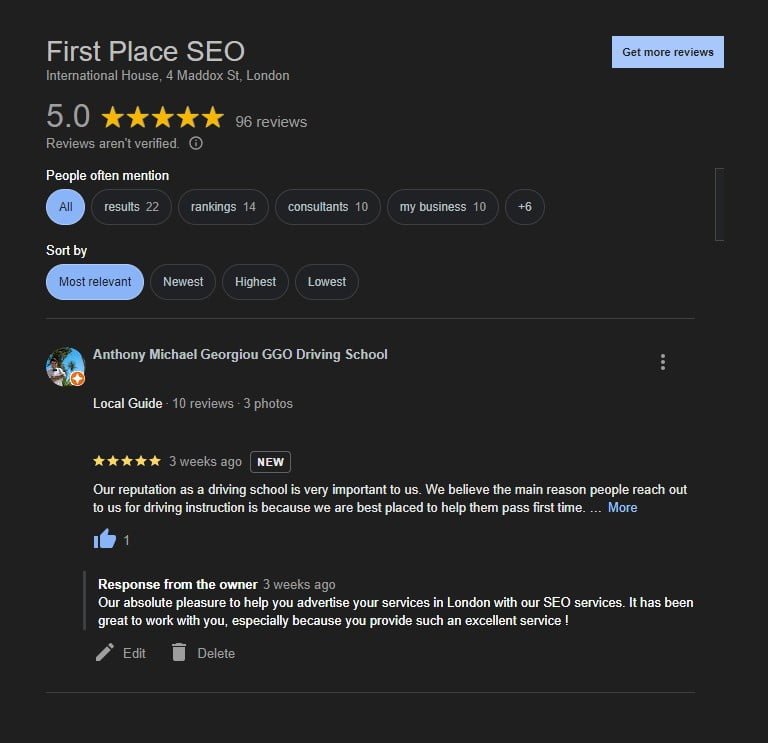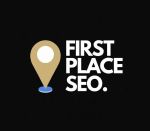Want to rank with citations?
So you want to rank for some competitive keywords, and maybe your Google My Business listing is ranking on page 1, but in positions 5-10. In order for your local listing to be shown on the front page, you have to rank in the top 2-3, so that is where local citations for SEO come into play.
What are citations?
Citations are directories where your business is listed which details your Company Name, Address, and Phone Number (NAPS). The more consistent your citations are across the internet, the more visible your business is when someone performs a local search. I.e. “SEO Company In London”


What are the best practices for local citation building?
1. Ensure NAP Consistency:
Make sure your business Name, Address, and Phone number (NAP) are consistent across all listings. Variations can lead to confusion and negatively impact local SEO.
2. Claim Listings:
Take ownership of business listings on important platforms like Google Business Profile, Yelp, Bing Places, and Apple Maps.
3. Complete Profiles:
Fill out each directory profile thoroughly, providing accurate NAP details, business hours, images, and relevant business information.
4. Use Relevant Categories:
Categorize your business correctly on each directory to increase its visibility to your target audience.
5. Monitor and Update Listings:
Regularly check for outdated information, duplicates, and errors. Update changes promptly.
6. Leverage Data Aggregators:
Submit business information to data aggregators like Foursquare, Neustar/Localeze, and Data Axle, which distribute data to other directories.
7. Utilize Industry-Specific Directories:
Get listed on directories specific to your industry, which are more likely to reach your target customers.
8. Encourage Customer Reviews:
Positive reviews help build trust and credibility. Encourage satisfied customers to leave reviews on prominent directories.
9. Build Unstructured Citations:
Reach out to local blogs, newspapers, and industry-related websites for mentions. Press releases and guest blogging are also helpful.
9. Use Tools for Efficiency:
Tools like Moz Local or BrightLocal can automate citation management and help track your citation-building progress.
By following these best practices, you’ll be better positioned to achieve accurate and authoritative local citations that support your local SEO efforts.


As a beginner, where shall I start creating citations for my website?
Duplicate Local SEO Citations Should You Worry
Impact of Duplicate Citations
If duplicate local citations and listing are identical and accurate I personally wouldnt worry about them. However if they hold inaccurate business data then it could cause a negative user experience as users may be confused by multiple, conflicting listings and find it difficult to trust your business’s credibility. It could also negatively impact local seo rankings as search engines may struggle to determine the correct listing, potentially harming your local rankings. Lastly it could lead to loss of potential sales as conflicting information might prevent potential customers from reaching you directly, leading to lost sales opportunities.How to Manage Duplicate Citations
Conduct Regular Audits: Periodically review all your listings to identify duplicates. Tools like Moz Local, BrightLocal, or Whitespark can help.
Claim and Manage Listings: Where possible, claim ownership of business profiles on various directories to manage data accurately.
Submit Corrections: Use the directory’s correction tools to merge or remove duplicates. Submit correction requests to their support teams when needed.
Use Consistent NAP Information: Ensure your NAP information is consistent across all directories.
Monitor Changes: Keep an eye on directory listings regularly to catch duplicates early and address them promptly.While duplicate citations aren’t the only factor affecting local SEO rankings, cleaning them up to ensure accurate, consistent information about your business is a good thing to do. Maintaining a reliable online presence helps build trust with both search engines and potential customers.
Local SEO citations without an address?

Local SEO: dofollow/nofollow and directory citations
In local SEO, understanding the difference between dofollow and nofollow links in directory citations can help you develop a more effective strategy. Here’s an overview:Dofollow vs. Nofollow Links:
- Dofollow Links:
- Pass on link equity (or “link juice”) to the linked site, improving its authority and potentially boosting its search engine ranking.
- These links are essential for SEO as they convey trust and credibility from one site to another.
- Nofollow Links:
- Contain a
rel="nofollow"attribute that tells search engines not to pass link equity. - They don’t directly impact rankings, but they can still be beneficial for driving traffic and creating brand awareness.
- Contain a
Importance of Directory Citations:
- Dofollow Directories:
- Listings in directories with dofollow links can improve your site’s domain authority and enhance ranking.
- Choose high-quality, reputable directories to avoid penalties from low-quality or spammy sites.
- Nofollow Directories:
- Despite not directly impacting SEO, these citations still matter because they create a diverse backlink profile.
- They can improve your business’s visibility across different platforms and boost credibility.
Building a Strategy:
- Focus on Relevance: Prioritize directories that are relevant to your industry and geographic area.
- High Quality: Choose reputable directories with good domain authority, whether offering dofollow or nofollow links.
- Consistency: Ensure that business information is consistent across all listings for effective local SEO.
- Diversify: Mix both dofollow and nofollow links for a balanced and diverse backlink profile.
Ultimately, both types of links can contribute positively to your local SEO strategy. Dofollow links enhance ranking directly, while nofollow links provide branding and traffic benefits.


